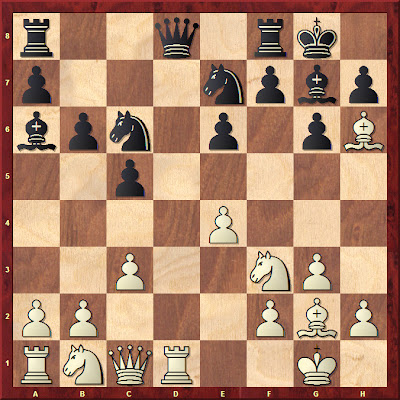Saturday, May 28, 2011
Congratulations to Boris Gelfand
Okay -- this counts as "history" only in the technical sense of having occurred in the past (h'm -- as opposed to what other time, exactly?) but it is an historic achievement. An Israeli chess player, Boris Gelfand, had become the challenger in the coming world championship match with Viswanathan Anand. Needless to say this is the first time ever an Israeli chess player had achieved this. Naturally this was front-page news in Israel.
Chess and Backgammon -- on TV
 |
| Photo credit: Online Backgammon |
For shame! The awful things some chess players will do to get recognition...
Thursday, May 26, 2011
Jewish Chess Players Get all the Hot Girls
Edward Winter gives, in Chess Notes 7076 and 7081, some excellent photographs of chess in Hollywood.
Of particular interest for Jewish chess history are the excellent quality photos of Fine, Reshevsky, Kashdan, Horowitz and others from Chess Review and Life magazine (given as links at the bottom of his post) with beautiful stars and starlets from Hollywood, taken during the 1945 Pan-American congress (see Winter's post for complete details about all the photos).
Above is one such photo, from Life, of Reuben Fine and Jane Nigh.
תוויות:
Fine,
Horowitz,
Kashdan,
Reshevsky,
tournament
Mistakes in Books
From Shaul Hon, reviewing the book Amanut ha'Sachmat ba'Krav uba'Kompositzia [Chess Art in Games and Compositions] by Mordechai Rosenfeld (Sorce: Maariv, 26/1/66, p. 20):
We find many mistakes in M. Rosenfeld's book... we shall not note all of them but here is one of the major ones:
On p. 86 the book says that "in the same year [1922] Alekhine met with the chess player 'Consultants' (קונסולטנטס) and defeated him [sic - A.P.] in a short and beautiful game". Who is this mysterious chess player "Consultants"? You shall look in vain in the history books -- he doesn't exist! The word means "consluting players" in English, when a master plays three of four players who consult among each other. Mr. Rosenfeld transcribed the word into Hebrew believing it's some player's name...
On the same page it says the game took place in the city of "Balle" (באל). Here, too, Mr. Rosenfeld transcribed from the foreign script without realizing that "Balle" is the French name of the city known [in English and Hebrew] of Basel (בזל).
Monday, May 16, 2011
Najdorf's Love Affair with Chess...
 |
| Historia de Amor [a love story] by Jose Criado |
There are many cartoons of chess players -- see here, for example -- but cartoons presented personally as a birthday present to players are much rarer.
But Daaaaaaaaad....!
From Ha'sachmat. ca. 1970 [unfortunately I do not have a good copy of the journal's cover!], by Zvi bar- Shira:
What counts as force majeure in chess? The head of the league committee, Yoel Aloni, was puzzled when he received the following question from the western Galilee: Natan Bronstein won [on time] in a league game because his opponent, the boy Shaul Har-El, was forcibly taken from the tournament hall by his father to prepare his homework.Aloni, report bar-Shira, decided that, after all, dad doesn't count as force majeure.
Saturday, May 14, 2011
Czerniak the Honest
The following game appeared in the letter section of the Israeli chess magazine, Shachmat, in 1983. The author of the letter, Uriel Zak, notes how he defeated the Moshe Czerniak in 12 moves, adding before the game itself that he hopes this letter will help the student of opening traps by showing that even a "seasoned international master" might fall into such a trap.
The game is notable for a few things:
1). Zak is quite respectful of Czerniak, mentioning his glorious past (a draw with Botvinnik) in the same variation.
2). The game does not appear in the "standard" databases.
3). It is not every day that an IM loses in 12 moves.
4). The editor of the game section of Shachmat at the time -- less than a year before his death? The man who who published this game? The same Moshe Czerniak.
The game is notable for a few things:
1). Zak is quite respectful of Czerniak, mentioning his glorious past (a draw with Botvinnik) in the same variation.
2). The game does not appear in the "standard" databases.
3). It is not every day that an IM loses in 12 moves.
4). The editor of the game section of Shachmat at the time -- less than a year before his death? The man who who published this game? The same Moshe Czerniak.
Czerniak,Moshe - Zak,Uriel [A04]
Be'er Sheva, 1979
[Annotations: Uriel Zak]
Source: Shachmat, 1983, 11-12 [Nov. - Dec.]. Letters to the editor section.
1.e4 c5 2.Nf3 Nc6 3.g3
Closed Sicilian. By the way, with this opening Czerniak drew with the great Botvinnik.
3...g6 4.Bg2 Bg7 5.0–0 e6
Botvinnik played 5...e5
6.d3 Nge7 7.c3 0–0
Who would believe the game would end in six moves?
8.Be3 b6! 9.Qc1 Ba6 10.Rd1 d5 11.Bh6
Sets a trap, since after 11...Bxh6 12.Qxh6 dxe4 13.Ng5 mates
11. ... dxe4 12.dxe4??
A natural move that loses immediately. 12.Bxg7! Kxg7 13.dxe4 Qc7=
12...Bxh6! 0–1
Subscribe to:
Comments (Atom)

